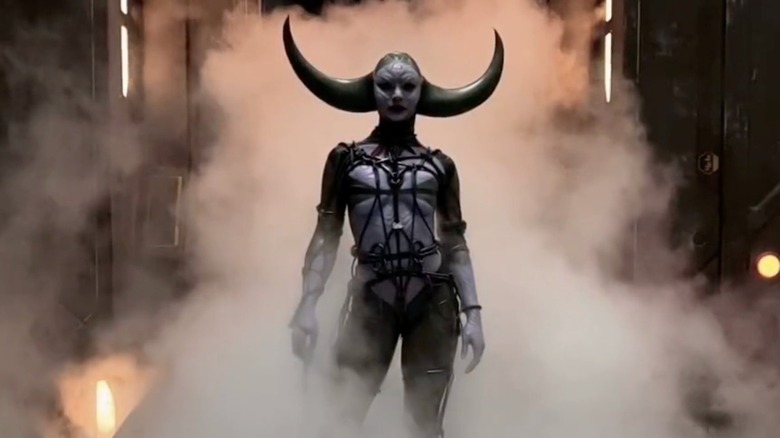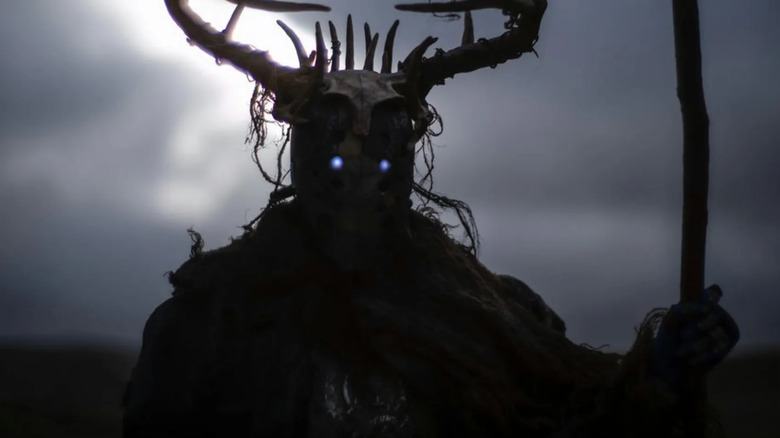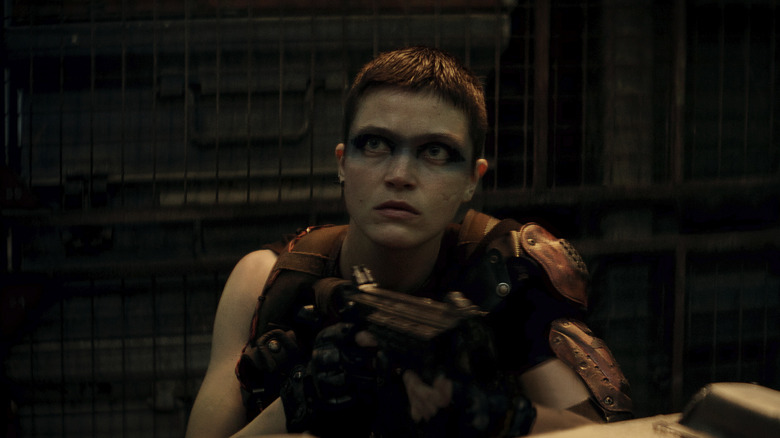Zack Snyder's Rebel Moon Began As A Film School Pitch
One can never accuse director Zack Snyder of playing small or aiming low. The quality of his films varies wildly, but he always seems to want to tell the largest version of his stories possible. Perhaps most notorious in the director's filmography is his four-hour cut of "Justice League," a movie that he had to initially abandon due to a personal tragedy and then return to complete years later, using an additional $70 million. He's fond of overblown action, operatic visual bombast, and a lot — a LOT — of slow-motion photography. Snyder has amassed a strangely passionate following of fans who leap to the director's defense at every available opportunity, eager to point out that something profound might be happening in his typically turgid pictures.
Snyder's next film is called "Rebel Moon," and it is due to be released on Netflix on December 22, 2023. It has already been announced that it will be the first part of a multi-part epic. "Rebel Moon Part 2" was shot at the same time as the first.
The story of "Rebel Moon" deliberately resembles that of "Star Wars," a film that Snyder has openly acknowledged as an influence. Set in the distant future, the galaxy is controlled by the Mother World's wicked government. The Imperium, the military of the Mother World, is attacking a vulnerable moon called Veldt. A former Imperium agent named Kora (Sofia Boutella) has to scour the galaxy for space warriors to defend her moon from the Imperium attackers.
If that sounds familiar, it's because it's the premise of Akira Kurosawa's "Seven Samurai."
/Film recently visited a press event for "Rebel Moon" with Snyder in attendance, and he revealed that he had wanted to make his own sci-fi "Seven Samurai" since he was in college.
Snyder's BFA
Incidentally, Snyder holds a BFA from the Art Center College of Design, which he earned in 1989. The idea of transposing Kurosawa's "Seven Samurai" into a new genre was already old-hat by then, as it was the premise of John Sturges' 1960 western "The Magnificent Seven" as well as Jimmy T. Murakami's 1980 sci-fi film "Battle Beyond the Stars." Perhaps fond of those movies, Snyder idly pitched the idea to one of his professors. That idle pitch turned into a concept he carried with him ever since. Snyder, it should be noted, is 57. He recalled the pitch though, as well as eventually shopping it around to major studios. He said:
"It started, I think, in college. I had said something to my professor about like, 'What about "Dirty Dozen" in space? Or an ensemble movie like "Seven Samurai" in space? And he was like, 'That's a pretty good pitch. What about it?' Because it was one of those classes where you were supposed to pitch a movie. And then I was like, 'Oh, I'd do it, that is cool.' Then we did try and sell it as a video game and as a movie at Warner Bros. a couple times."
It's a pretty peerless premise. A vulnerable town/planet is about to be besieged by criminals or bandits, and the citizens have to find warriors to defend them at the last minute. Because they are poor and desperate, however, their brave warriors are a ragtag group of barely-capable fighters who must learn to overcome their differences and perform a noble task. There's a reason so many other filmmakers have borrowed the premise for themselves. Heck, even movies like "Three Amigos" and "A Bug's Life" have used it.
Seven Samurai in Space
It seems that the "Rebel Moon" video game idea didn't really find a foothold. Snyder noted that a really huge, AAA video game requires more time to make than a feature film, and pre-selling a game based on a movie that hasn't yet proven successful is dodgy; there may be a reason why most movie tie-in video games don't get a lot of acclaim (there are, of course, multiple exceptions).
"We pitched it to them, they were like, 'Oh.' Because I had this idea at the time that I was like, I really want to do and I still would love to at some point [...] But really, I don't think anyone's nailed the 'giant video game' and 'movie' at the exact same time. Really nailed it. Where the video game is as good as the movie and the movie's as good as the video game. And they cross-pollinate and there are Easter eggs in both. And I wanted to do it and they were like, 'Nah, I don't know.'"
Deborah Snyder, Zack's frequent producing partner and wife, was the one to point out the timing between video game production and movie production. "Because," she said, "a video game has too much lead time. You'd be like, 'Well, let's see if the movie's good.' Then you'd be like, 'Well ...' if it's going to be a crappy game ..." It seems that the Snyders wanted to assure that the proper amount of time and attention be paid to both a game and a feature.
As of this writing, no game has manifested, but the movie is, as mentioned, going to be characteristically enormous.


